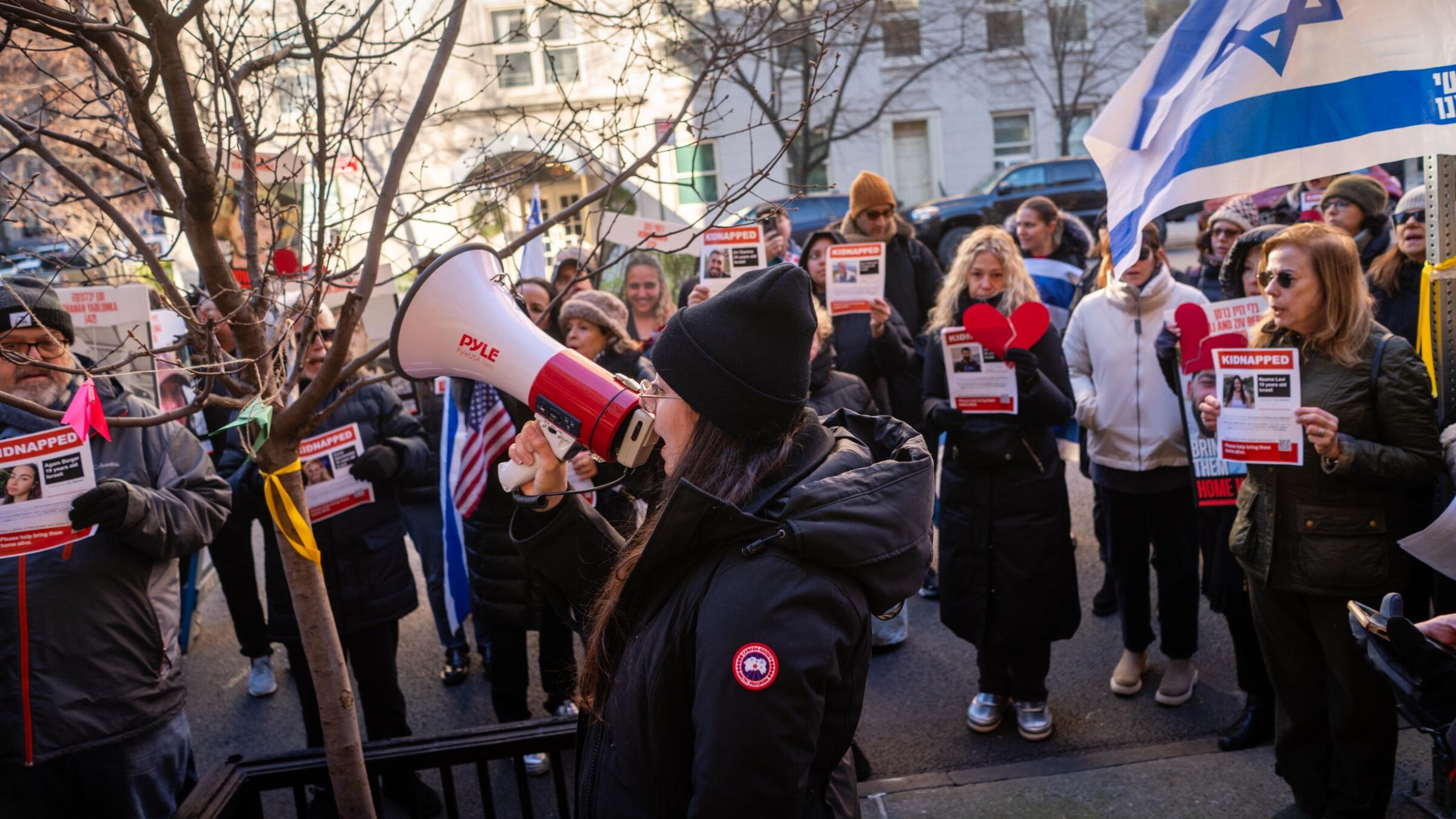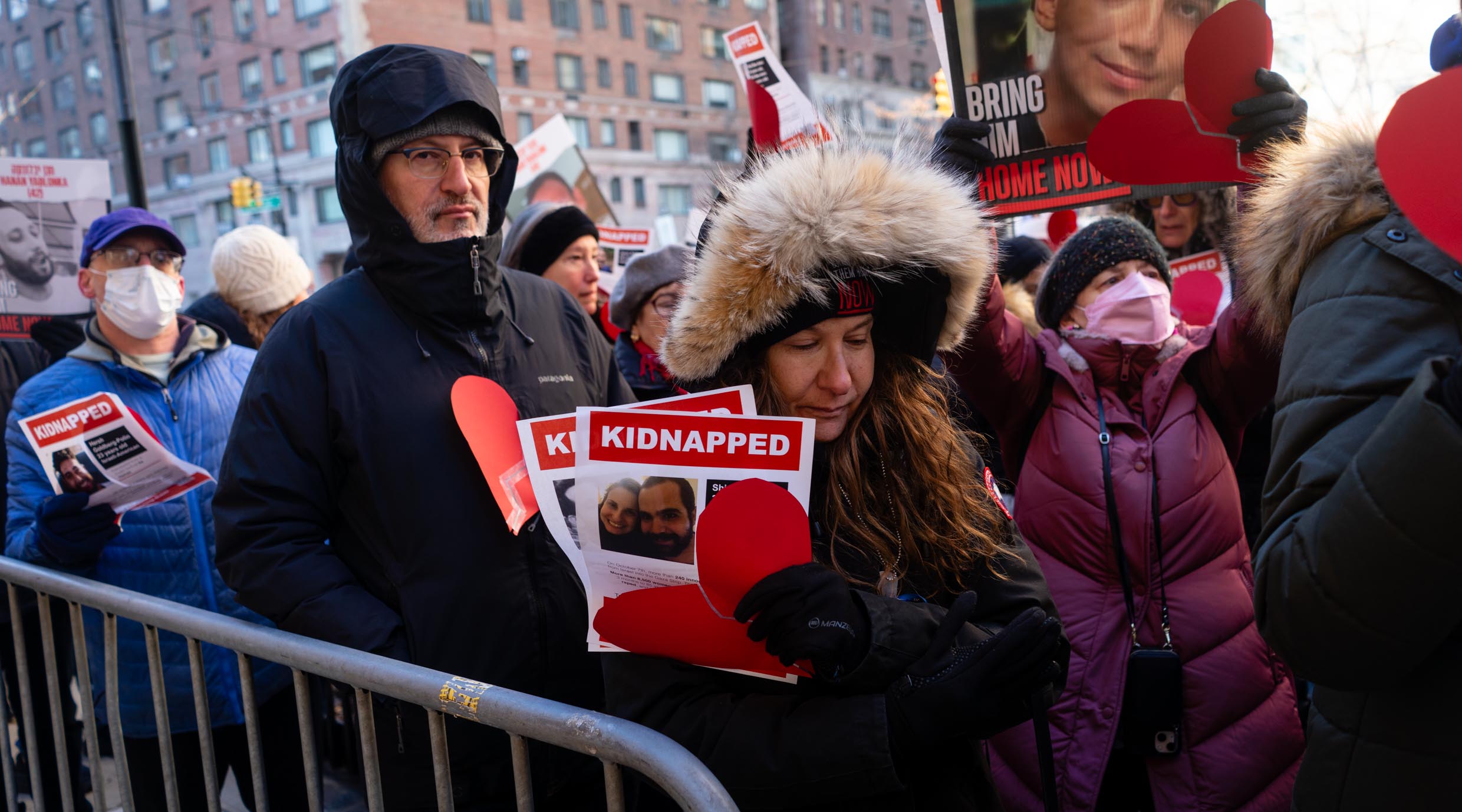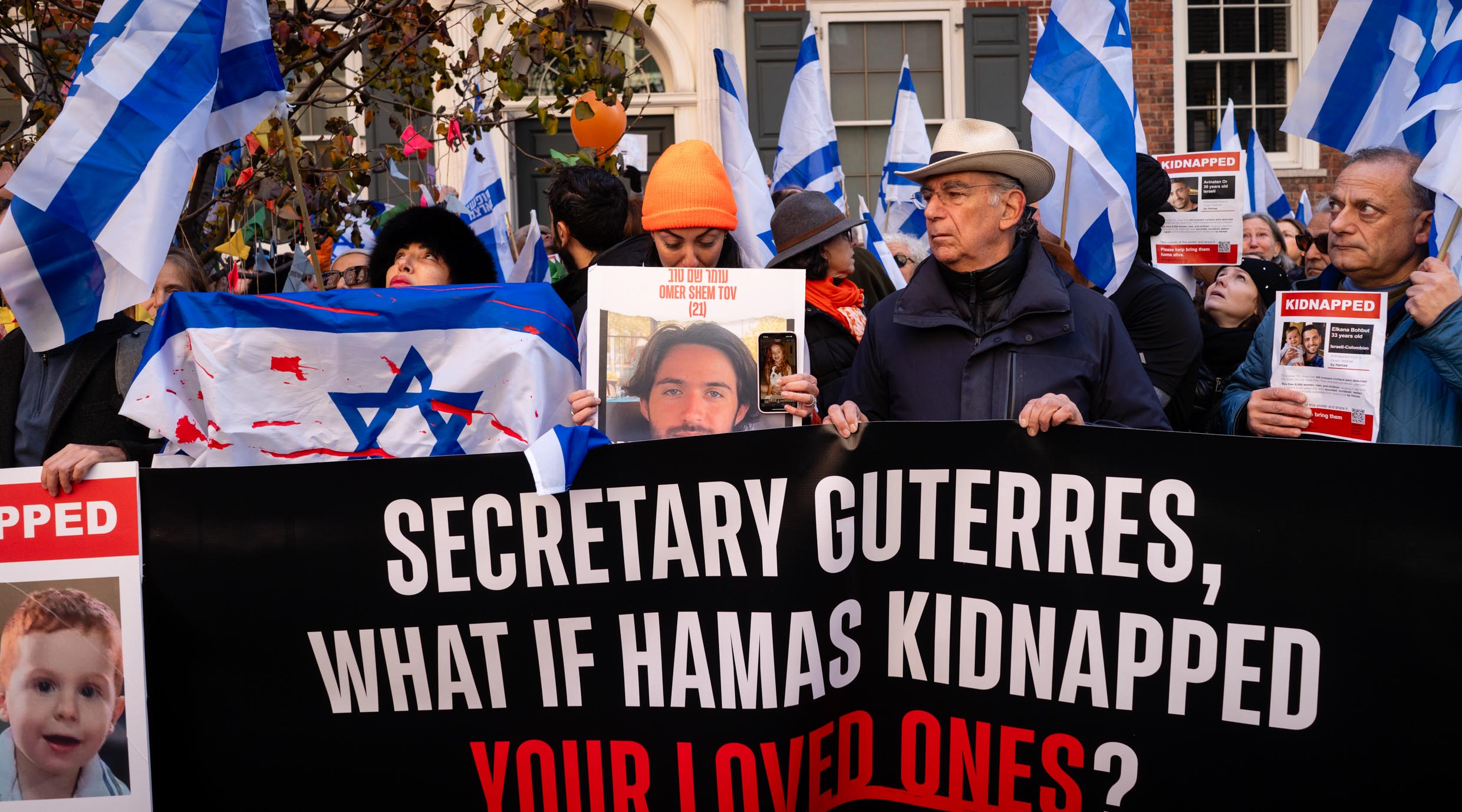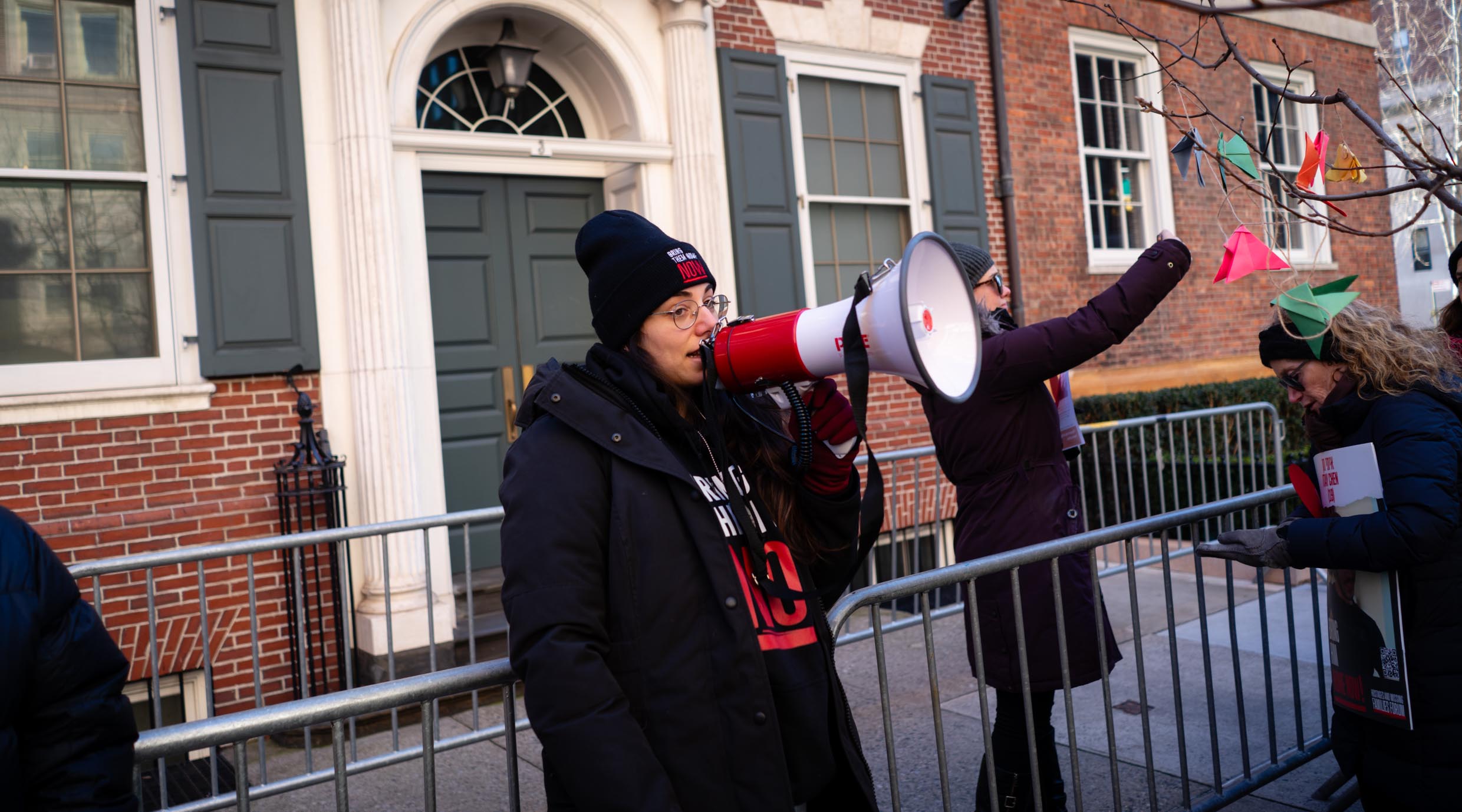‘I don’t think he’s against us’: Israeli protesters dialogue with UN chief during encounters outside his home
Every Friday, a group of NY-based Israelis rally outside Antonio Guterres’ Sutton Place home. Over the months, they have built a rapport.

Protest leader Shany Granot-Lubaton leads a crowd outside the home of U.N. Secretary-General Antonio Guterres, January 5, 2024. (Luke Tress)
(New York Jewish Week) — One Friday morning last month, as United Nations Secretary-General Antonio Guterres took the short walk from his townhouse to his car in freezing weather, he was confronted by a group of around Israeli protesters who peppered him with questions about the war in Gaza and his efforts to free the hostages held by Hamas.
Guterres — flanked by security — stopped for a few seconds to chat, his breath visible in the chill. He complained about his portrayal in the Israeli press. A protester handed him a card from the families of the hostages.
Shany Granot-Lubaton, one of the protest leaders, asked him about his reaction to a 47-minute film of Hamas’ atrocities, produced by the Israeli government.
“How was watching the horror movie?” she asked.
“It is human nature at its worst,” Guterres said.
The protesters thanked him, and he moved on.
Friday morning demonstrations outside Guterres’ Sutton Place home has become something of a ritual for several dozen Israeli-Americans advocating for the 136 hostages still held in Gaza. Shortly before 9 a.m., they gather on the sidewalk outside Guterres’ stately brick home, its front door framed by two white Greek pillars. Their hope is to catch him while he is exiting with a handful of security guards, and to talk with him before he gets into a black Mercedes sedan parked at the curb.
Israel has a famously adversarial relationship to the U.N., and at first, that was the activists’ posture as well. But as they approach 100 days since Oct. 7, and prepare for a large rally outside the U.N. on Friday, a change is afoot: Guterres and the protesters have warmed up to each other.
“At the beginning we were very, very angry and shocked by how they reacted, and we felt like the U.N. was totally not standing for the hostages and for Israel,” Granot-Lubaton told the New York Jewish Week.
But now, she said, “He’s listening to them, he’s meeting with them. Does he do enough? Of course not. He’s not doing enough, but it’s not as it was at the beginning. Every week, when he sees us, he stops, he speaks with us respectfully, he’s listening, so I respect him for that. He could have done it differently.”
A spokesperson for Guterres, Stéphane Dujarric, said the feeling was mutual.
“Whenever he’s in New York, they’re outside and he talks to them and he always welcomes the dialogue,” Dujarric said. “His door is always open.”

Protesters outside the home of U.N. Secretary-General Antonio Guterres, January 5, 2024. (Luke Tress)
The protests began as a way to castigate the U.N. chief. On Oct. 25 last year, Guterres incensed Israelis by saying that the Hamas attack “did not happen in a vacuum,” linking the terrorist atrocities to occupation, settlements and economic woes. That statement led Gilad Erdan, Israel’s U.N. ambassador, to call for Guterres’ resignation.
The demonstrations outside Guterres’ home started that week. The activists cut their teeth on protests in New York against the Israeli government’s judicial overhaul before pivoting to hostage advocacy after Oct. 7. They borrowed a tactic from their counterparts in Israel, who have been protesting outside officials’ houses for the past several years.
At first, they were angry with the U.N. and Guterres’ response to the Hamas attack, which killed 1,200 people, mostly civilians, and took 240 hostages, alongside other atrocities. But the activists’ views softened after Guterres viewed the Israeli government’s graphic video of the Hamas attack, and met with hostages’ families.
“At the beginning we were very angry, there was a lot of anger, like, ‘We’re going to come in front of his house and yell at him,’” said Yaala Ballin, an Israeli jazz singer who has lived in the city for 19 years and is part of the core of the Friday morning protesters.
“We kind of changed our position,” she said. “We realized that we need his help and we need to keep him on our side and we want to have him join our purpose, bring our side out there.”
Gradually, she said, Guterres began to engage. First he began pausing before getting in the car, moments that later turned into brief, cordial exchanges. “The last time was really a conversation,” she said.
In one of the encounters with the protesters, in early December, as Guterres was walking out the door, a demonstrator pursued him while holding a hostage flier, saying, “We just wanted to remind you that our hostages are still in Gaza.”
“I’m totally committed,” Guterres responded.
Granot-Lubaton said Guterres was more approachable than some of the Israeli government’s own ministers.
“He is not the demon in this story, although there are people who are trying to make him that way, but at the same time he could do a lot more,” she said. “It’s not a black and white thing.”
The demonstrators feel like they’re having an impact. Hours after the exchange with Granot-Lubaton about the film, Guterres demanded on X, formerly Twitter, that all hostages be released “immediately and unconditionally.”
“Nothing can possibly justify the horrific terror attacks launched by Hamas on 7 October,” Guterres said. But the Israeli activists don’t quite feel that he’s on their side: He followed that statement with three posts either criticizing Israel or expressing alarm about the violence in Gaza.

Protesters outside the home of U.N. Secretary-General Antonio Guterres, December 8, 2024. (Luke Tress)
Guterres has also shown the protesters that he carries dog tags reading “Bring them home” in his pocket. The dog tags are part of a campaign by the families of hostages, some of whom gave the item to Guterres during a meeting.
He carries them, Granot-Lubaton pointed out, but does not wear them.
“I think in a way it symbolizes his entire reaction to this crisis. Maybe he does care about the hostages, but for different political reasons and the way the U.N. works right now, he’s not wearing it,” Granot-Lubaton said. “He’s not public enough with his commitment.”
Dujarric, the Guterres spokesperson, said, “From the start, the secretary-general has been heartbroken and devastated about what happened and what is happening to the hostages” and continues to push for their release.
“What he’s been saying on the hostages from the get-go is they need to be released unconditionally, that nothing can justify it,” Dujarric said.
Guterres isn’t always there on Friday mornings, and whether or not he shows up, the demonstrators stay for about 30 minutes, holding fliers with the faces of the hostages and reading out the captives’ names. They hang colorful origami cranes symbolizing the hostages on a tree outside Guterres’ front door. Lampposts in the quiet, upscale neighborhood are plastered with the fliers, which are ubiquitous on the city’s streets and have become a battleground between pro- and anti-Israel activists.
Hostage families and Israeli officials, including left-wing politicians such as Yair Golan and Gilad Kariv, have spoken at the events outside Guterres’ home. Balllin usually sings the Israeli national anthem, “Hatikva,” at the end of the rallies. She said the demonstrators have also become friendly with police outside Guterres’ home.
Guterres’ powers as secretary-general are limited, but the activists believe he sets the tone for much of the international community. They say international agencies can do more to help liberate the hostages, including pressuring Qatar and Egypt, which hold sway with Hamas’ leaders, to push for their release.

Protest leader Shany Granot-Lubaton leads a crowd outside the home of U.N. Secretary-General Antonio Guterres, January 5, 2024. (Luke Tress)
The demonstrators are also seeking more straightforward and specific condemnation of Hamas’ war crimes, including statements that are not accompanied by criticism of Israel. In late November, Guterres condemned “accounts of sexual violence during the abhorrent acts of terror by Hamas” for the first time. Granot-Lubaton is hoping for stronger language.
“I would appreciate him saying that rape and kidnapping people and murdering innocent people is not a legitimate way of resistance,” Granot-Lubaton said. “You don’t need high moral standards to say such a thing.”
Guterres has also voiced grievances to the protesters, including about his portrayal in the Israeli media after a tense encounter with hostage families. “What I read in the Israeli press was not what I said,” Guterres said.
“We know,” one of the protesters said.
And the protesters have tried to address his concerns. Ballin said some of them contacted an Israeli reporter asking for a change to an article to better reflect what had actually happened.
“I’m not angry with him anymore. I don’t think he’s against us,” Ballin said. “I think he ran into a very, very complicated situation and he’s not doing enough. I’m not angry, I just feel like he needs to be directed and reminded of the good he can do.”
She added, “We need him, and we feel he can really help just make statements loud and clear for the world to follow.”
This article originally appeared on JTA.org.
A message from our Publisher & CEO Rachel Fishman Feddersen

I hope you appreciated this article. Before you go, I’d like to ask you to please support the Forward’s award-winning, nonprofit journalism so that we can be prepared for whatever news 2025 brings.
At a time when other newsrooms are closing or cutting back, the Forward has removed its paywall and invested additional resources to report on the ground from Israel and around the U.S. on the impact of the war, rising antisemitism and polarized discourse.
Readers like you make it all possible. Support our work by becoming a Forward Member and connect with our journalism and your community.
— Rachel Fishman Feddersen, Publisher and CEO























